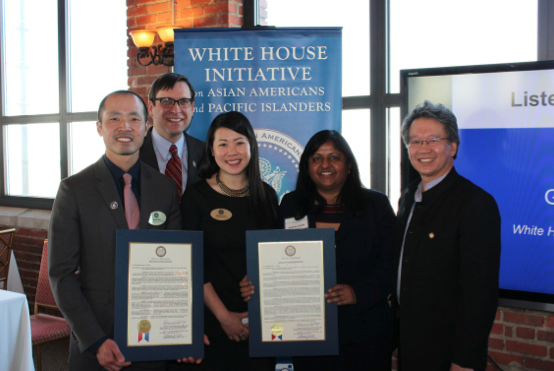
According to the U.S. Census Bureau, Asian Americans and Pacific Islanders (AAPIs) represent around 5.5% of Ohio’s population. Furthermore, AAPIs are one of the state’s fastest-growing demographic groups, having grown by 40 percent between 2000 and 2009.
As part of the White House Initiative on Asian Americans and Pacific Islanders (WHIAAPI)’s regional engagement efforts, particularly in cities with large and emerging AAPI communities, WHIAAPI held a Cleveland AAPI Community Listening Session on January 28, 2015. The Listening Session was held at the Ariel International Center in downtown Cleveland and drew nearly 100 community leaders from across business, nonprofit, and public sectors.
Over a dozen federal agencies were represented, including the U.S. Citizenship and Immigration Services, U.S. Department of Education, Equal Employment and Opportunity Commission, Small Business Administration, Minority Business Development Agency (MBDA), Occupational Safety and Health Administration, U.S. Department of Labor Wage and Hour Division, Social Security Administration, U.S. Department of Housing and Urban Development, U.S. Department of Health and Human Services, and U.S. Department of Veteran Affairs. Each agency provided an overview of its work particularly with services to the AAPI community, such as SSA’s Multilanguage Gateway that includes translated materials and free interpreter services or MBDA’s Cleveland Business Center that provides free counseling to local businesses.
Federal representatives and community members then participated in break-out sessions to dive deeper into the issues of housing, education, immigration, labor and workers’ rights, health and human services, social security, and business. We greatly valued the perspectives of the community members and worked together to brainstorm recommendations on how the federal government can address key challenges. In the upcoming months and as a follow-up to the Listening Session, then White House Initiative on AAPIs looks to provide tailored technical assistance and trainings to the Cleveland community. We look forward to continuing our collaboration with Cleveland as we work to open the federal government’s doors to all AAPIs.
--
Michael Byun is a member of the President’s Advisory Commission on Asian Americans and Pacific Islanders.



